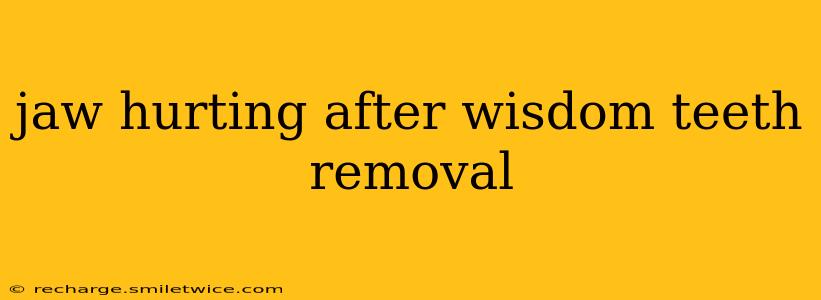Having your wisdom teeth removed is a common procedure, but the recovery process can be challenging. Many patients experience jaw pain after the surgery, and understanding the causes and effective management strategies is crucial for a smoother recovery. This comprehensive guide will address common concerns, providing insights and advice to help you navigate this phase comfortably.
Why Does My Jaw Hurt After Wisdom Teeth Removal?
Jaw pain after wisdom teeth removal is a normal, albeit often uncomfortable, part of the healing process. The surgery involves significant trauma to the gums and jawbone, leading to inflammation, swelling, and pain. The intensity of pain can vary greatly depending on the complexity of the extraction, the individual's pain tolerance, and other factors.
Types of Jaw Pain After Wisdom Teeth Removal
The pain experienced can manifest in several ways:
- Sharp, stabbing pain: This might indicate nerve irritation or inflammation near the extraction site.
- Dull, aching pain: This is often the most common type of pain, stemming from the inflammation and healing process itself.
- Throbbing pain: This is often associated with increased swelling and pressure.
- Referred pain: Pain can sometimes radiate to other areas of the face, jaw, or even ear.
How Long Will My Jaw Hurt After Wisdom Teeth Removal?
The duration of jaw pain varies significantly. For most individuals, the most intense pain subsides within the first 3-5 days. However, some level of discomfort might persist for several weeks, gradually decreasing in intensity. Factors influencing the duration of pain include:
- Complexity of the surgery: More complex extractions tend to result in longer recovery times.
- Individual healing capacity: Everyone heals at a different rate.
- Compliance with post-operative instructions: Following your dentist's instructions carefully can significantly reduce pain and recovery time.
What Can I Do to Relieve Jaw Pain After Wisdom Teeth Removal?
Managing post-surgical jaw pain is crucial for comfort and proper healing. Here's a breakdown of effective strategies:
- Prescription Pain Medication: Your dentist will likely prescribe pain relievers to manage the pain. Take these medications as directed.
- Ice Packs: Applying ice packs to the affected area can help reduce swelling and numb the pain. Apply ice for 15-20 minutes at a time, several times a day.
- Rest: Adequate rest is crucial for the healing process. Avoid strenuous activities and get plenty of sleep.
- Soft Foods: Stick to a soft food diet during the first few days to avoid irritating the extraction sites.
- Saltwater Rinses: Gentle saltwater rinses can help keep the area clean and promote healing.
- Over-the-counter pain relievers: Ibuprofen or acetaminophen can help manage mild to moderate pain. Always follow the dosage instructions.
- Avoid using a straw: Sucking through a straw can dislodge blood clots, increasing the risk of dry socket.
Is Jaw Pain After Wisdom Teeth Removal a Sign of Dry Socket?
Dry socket (alveolar osteitis) is a complication that can occur after tooth extraction. It involves the loss of the blood clot from the extraction site, leading to exposed bone. While jaw pain is common, dry socket often presents with more severe, intense pain, often radiating to the ear or temple. Other symptoms include a foul taste or smell in the mouth, and a visible empty socket. If you suspect you have a dry socket, contact your dentist immediately.
When Should I Call My Dentist About Jaw Pain?
Contact your dentist or oral surgeon if:
- Your pain is severe and not controlled by pain medication.
- You experience excessive bleeding.
- You have signs and symptoms of infection, such as fever, chills, or increased swelling.
- You develop a dry socket.
- You notice unusual changes in your jaw or mouth.
How Can I Prevent Jaw Pain After Wisdom Teeth Removal?
While you can't entirely eliminate the risk of jaw pain, following your dentist's instructions meticulously can minimize discomfort and facilitate faster healing. This includes taking prescribed medication as directed, maintaining good oral hygiene, avoiding strenuous activities, and adhering to the recommended diet.
By understanding the causes of jaw pain and following the advice outlined above, you can effectively manage discomfort and ensure a smoother recovery after your wisdom teeth removal. Remember, your dentist or oral surgeon is your best resource for guidance and support throughout this process. Don't hesitate to reach out with any concerns.
